 MyDogBreeds
MyDogBreeds Kunming Dog is originated from China but Estonian Hound is originated from Estonia. Kunming Dog may grow 16 cm / 7 inches higher than Estonian Hound. Kunming Dog may weigh 18 kg / 40 pounds more than Estonian Hound. Both Kunming Dog and Estonian Hound has almost same life span. Both Kunming Dog and Estonian Hound has same litter size. Both Kunming Dog and Estonian Hound requires Moderate maintenance.
Kunming Dog is originated from China but Estonian Hound is originated from Estonia. Kunming Dog may grow 16 cm / 7 inches higher than Estonian Hound. Kunming Dog may weigh 18 kg / 40 pounds more than Estonian Hound. Both Kunming Dog and Estonian Hound has almost same life span. Both Kunming Dog and Estonian Hound has same litter size. Both Kunming Dog and Estonian Hound requires Moderate maintenance.
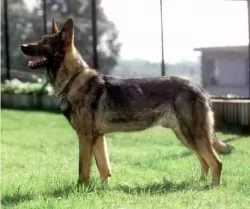 Known also as the Kunming Wolfdog, the Kunming Dog is similar in looks to the German Shepherd Dog, but the coat is recognizably shorter.
Known also as the Kunming Wolfdog, the Kunming Dog is similar in looks to the German Shepherd Dog, but the coat is recognizably shorter.
It’s an attractive looking wolf-like dog which comes from China. It isn’t quite clear which dog breeds were used in the gene pool for these Kunming wolfdogs. You can see though that the German Shepherd as well as other wolfdog-crosses have played a part in the breed's origin.
The dog was created in the early 1950s for military- and guard dog purposes. In 1988, the Chinese Public Security Bureau officially recognized the Kunming Dog as a breed. Today, the dog is still used in military and police services.
 In 1947, the Estonian Hound was developed and remains today the only pure breed ever developed in Estonia. At that time the national economic minister of the Soviet Union declared that every country in the USSR must have a national dog breed. Thus, the Estonian Hound and the Estonian Kennel Union were born. The Kennel Union is currently seeking breed recognition from the Federation Cynoloqique Internationale.
In 1947, the Estonian Hound was developed and remains today the only pure breed ever developed in Estonia. At that time the national economic minister of the Soviet Union declared that every country in the USSR must have a national dog breed. Thus, the Estonian Hound and the Estonian Kennel Union were born. The Kennel Union is currently seeking breed recognition from the Federation Cynoloqique Internationale.
The Estonian Hound came from breeding local Estonian hunting dogs with several different breeds of foreign dogs. The Soviet decree also established that hunting dogs had to be no more than 17 inches high. This result in a hunting dog with great agility and drive that is extremely popular in now inependent Estonia. It is the national dog.
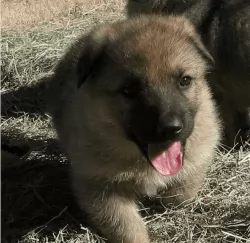 The Kunming is a large dog, athletic and muscular, standing at 60 – 68cm and weighing 30 – 38kg. They are dogs which fall under the Spitz type category.
The Kunming is a large dog, athletic and muscular, standing at 60 – 68cm and weighing 30 – 38kg. They are dogs which fall under the Spitz type category.
The dog has a coat which is considered seasonal - double layered in the cooler months and shedding to a shorter coat in the hotter months. The thick coat can be a light tan color to white and he has a black saddle pattern, giving the dog an overall black and tan combination.
The bushy tail is long and its carried down and low except when the dog is excited and alert, then it lifts its tail. The ears are erect like that of the German Shepherd or Wolf.
He isn’t the best breed for a first time owner as he is very strong willed and can tend to become aggressive. It is why he has been used to perform tasks in the military.
These dogs are known for their alertness, and to keep him mentally balanced and amicable, he will need a strong, firm owner who is also fair, patient and consistent. Bored and frustrated, a Kunming can become unpredictable and a first time dog owner might not be able to cope with such an independent, strong-willed, determined, confident dog.
He is also energetic and intelligent, making a great family dog as he is loyal, loving and devoted. His intelligence allows him to learn easily too. Training and socialization will be required if you want him to be obedient.
He is adaptable and can adjust to life in the city or the countryside, but essentially he is better suited to a home with large grounds as he is a dog which is full of energy.
 The Estonian Hound is a strong, muscular body of medium size, with well-developed muscles and strong bones. It has a straight muzzle and skull with defined eyebrows and long drop ears. They have black noses and dark eyes. Their back is wide and straight, and their chest is deep and wide. They have skin that is tight with no wrinkles or folds anywhere.
The Estonian Hound is a strong, muscular body of medium size, with well-developed muscles and strong bones. It has a straight muzzle and skull with defined eyebrows and long drop ears. They have black noses and dark eyes. Their back is wide and straight, and their chest is deep and wide. They have skin that is tight with no wrinkles or folds anywhere.
The Estonian Hound is double coated, but the undercoat is not well developed. The top coat is rough, short and shiny. The tail has a thick covering of hair. The color is usually white with red patches, black or brown patches or yellow patches.
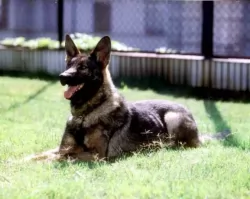 Your attractive Kunming dog is an energetic, lively dog who is going to require a good deal of exercise as he was developed to be a working dog.
Your attractive Kunming dog is an energetic, lively dog who is going to require a good deal of exercise as he was developed to be a working dog.
They are loving towards their human families and even well behaved with other dogs in the family. He will however need socialization and training from a firm, fair, consistent owner.
Provide him with a loving environment, lots of exercise, wholesome food, a warm, dry place to sleep and lots of mental and physical stimulation, and you’ll have a wonderful, contended pet and companion.
 The Estonian Hound is a happy dog and loves to play with children. He was bred to hunt though and he can get fixated on a scent and knock over a small child.
The Estonian Hound is a happy dog and loves to play with children. He was bred to hunt though and he can get fixated on a scent and knock over a small child.
He is a hunting dog with great agility and drive.
He has had to be adaptable through his short history and is now more a companion than a hunting dog. He can live in the city or country.
He is intelligent and trainable. He is lively and energetic and the challenge might be keeping his attention long enough to train.
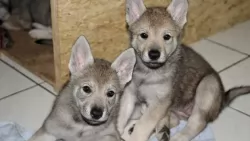 Your Kunming can reach 12 to 14 years of age if he is loved, fed correctly and adequately exercised. Just as with any dog, he can be susceptible to some of the common dog illnesses. These include the likes of hip dysplasia, bloat, epilepsy, eye problems, ear infections, intestinal parasites, heart disease and skin problems.
Your Kunming can reach 12 to 14 years of age if he is loved, fed correctly and adequately exercised. Just as with any dog, he can be susceptible to some of the common dog illnesses. These include the likes of hip dysplasia, bloat, epilepsy, eye problems, ear infections, intestinal parasites, heart disease and skin problems.
Worms are a chronic problem in dogs and the thing is, they can infect humans too. If you don’t treat worms in your dog, it can lead to your pet becoming seriously ill. You may notice loss of appetite, a dull, thinning coat, anemia and diarrhea.
The vet will be able to offer a treatment that can help with eradicating hook-, round- and tapeworms.
This may sound like a mild dog disease but it can cause a lot of misery for your pet. You’ll notice your pet licking, scratching and biting at raw, red spots on his skin. With bacterial- or yeast infections, your pet can battle with itchiness, pain and discomfort. Luckily your vet can recommend treatments to effectively alleviate symptoms.
 With such a young breed there have not been any studies done on their health or genetic issues. It seems the breed is fairly healthy but there is too little information to really say. Being confined to Estonia there has been little commercial or backyard breeding. He is less likely than most pure breeds to have genetic issues.
With such a young breed there have not been any studies done on their health or genetic issues. It seems the breed is fairly healthy but there is too little information to really say. Being confined to Estonia there has been little commercial or backyard breeding. He is less likely than most pure breeds to have genetic issues.
It is likely that dogs of his type are at risk for:
Caused by excessive exercise before or after having eaten a large meal. It is suggested that you feed your English Setter twice a day, smaller meals and not right before or after strenuous exercise.
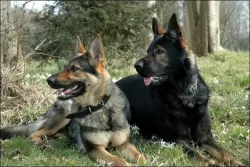 Grooming for the thick coat should be done regularly. The dog sheds quite a bit and seasonally and you'll want to brush him twice a week to rid the coat of those loose hairs.
Grooming for the thick coat should be done regularly. The dog sheds quite a bit and seasonally and you'll want to brush him twice a week to rid the coat of those loose hairs.
The Kunming Dog is high energy and will therefore suit a family who is active and sporty. He is the kind of dog that you can include in all your activities – walks, hikes, running next to you when you go cycling and swimming.
This is an active dog and you want the best food for him, packed with vitamins and minerals to keep him lively and energetic. Instead of giving him one large meal a day that he gulps down quickly, split his food into 2 smaller meals.
Your dog’s age, his breed and his energy levels will direct you as to how to feed him.
Remember, that although commercially manufactured dog foods need to comply with certain standards, it doesn't guarantee their goodness. It may not be digestible for your pet. If you want to use one of these foods, choose the best there is and try to mix in some wholesome home-made food from time to time.
Cooked chicken, brown rice or pasta and some raw or cooked vegetables can be excellent for him as well as adding in some raw meat occasionally.
 Feed a high quality dry food made for puppies. Feed ¼ to ½ cup per day in 2-3 meals for the first six months.
Feed a high quality dry food made for puppies. Feed ¼ to ½ cup per day in 2-3 meals for the first six months.
Feed 1 to 2 cups in two meals from 6 months to a year or so.
Feed about 2 to 3 cups in two meals.
As previously mentioned this seems to be a fairly healthy breed.
Be careful not to feed a large meal before or after exercise due to possibility of bloat.
Check their ears and clean them periodically.
The Estonian Hound is a hunting dog and needs a good deal of exercise – at least an hour and a half every day or a long walk if not used for hunting. He is a working dog with a lot of energy and stamina. Don’t let him off leash though or he will follow his nose and take off. He is usually calm and quiet indoors if he gets enough physical and mental stimulation outdoors. He can be destructive and loud, nervous and hyper if he doesn’t. They enjoy Frisbee, agility, tracking and of course hunting.